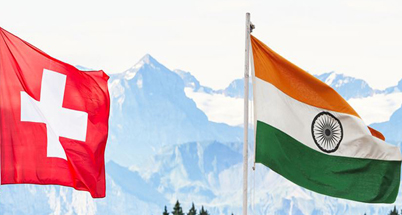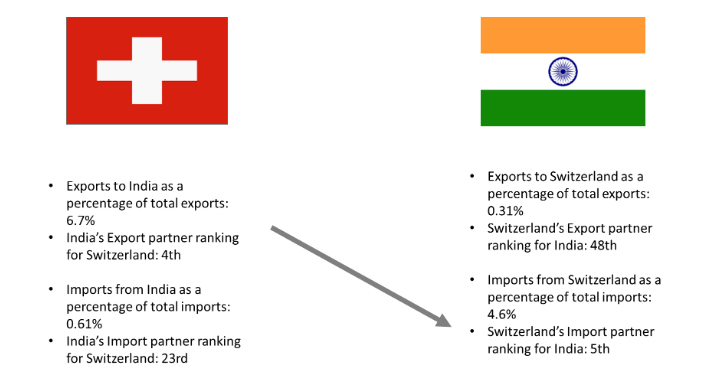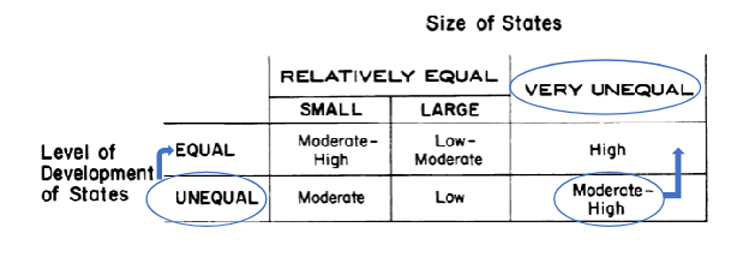
A Review of Indo-Swiss Trade: Strategic Priorities from a Realist Perspective
Posted On Monday, April 26, 2019 by Arpit Chaturvedi under International Trade & Economics Uncategorized

Written by Arpit Chaturvedi
Switzerland was one the very first friends of independent India. The two nations signed their ‘Treaty of Friendship and Establishment’ on August 14 th , 1948 – an year after India’s Independence from the British rule, as they swore “perpetual peace and unalterable friendship” and also conferred the status of “most favored foreign nation” on each other. Culturally and politically, even though placed in different contexts, India and Switzerland have had much in common. To begin with, both nations have had a history of handling diversity and the experience of a polity engendered by home-grown republics. With four national languages and 26 cantons today, the development of Swiss republics has striking similarities with that of the multilingual Indian state which finds it current form through a long process of evolution from the ancient political structures of “sanghas”, “ganas”, and “mahajanpadas”. Thus, the traditions of democratic decision making have been native to both countries. Through the annals of history, both nations today have emerged as having the dual attributes of – (a) the strength to safeguard one’s own security and (b) a commitment towards global peace and non-aggression. The similarities in the historical evolution and shaping of the characters of both nations renders them as likely partners in an ever-changing international order.
Trends in Trading Relations
In international relations theory, aspects such as similarities in culture, polity, national character, and stance towards other international players are considered predictive determinants of trading and economic relations. The trading relations between India and Switzerland date back to at least the mid- 19 th century with the coming of the Volkart Winterthur Company that set shop in Bombay and later even served as the first Swiss consul in India. Not only did Volkart Winterthur once give employment to the famous Indian spiritual leader – Swami Dayanand Saraswati,1 the Winterthur also found reciprocation from Indian merchant houses in form of recommendations on the Volkarts’ respectable character when they wanted to establish themselves more firmly in the European cotton trade – an exemplification of what has been called as "relational capitalism".2
The two centuries of trading relations have fostered a conducive environment and as a result more than 250 Swiss companies have presence in India today along with Swiss investment inflows of approximately USD 7.71 billion into the Indian nation.3 On the other hand, about 100 Indian companies have invested about USD 1.2 billion between 2012 and 2014 in Switzerland, "placing it among the top five European investment destinations and top-ten places globally for Indian investors."4
Challenges and Opportunities
While Switzerland is the 5th largest trading partner for India, recent trends in Indo-Swiss trade indicate some attenuation in the trading intensity given the adverse currency movements and the changing structure of the international markets. From 2010-11 levels, the Indian exports to Switzerland (mainly organic chemicals (28%), precious stones and jewelry (11%), textiles and apparel (15.6%) etc.)5 reduced from $689.79 million to $401.87 in 2016-17 - a decline of nearly 41.7%. Similarly, the imports from Switzerland to India (mainly pearls, precious stones, and metal (92%), machinery, nuclear reactors, and boilers (1.9%) etc.)6 have also decreased by 75% - from approx. $24,802 million in 2010-11 to $5,971 million in 2016-17. Indeed, the slowing rate of trade between the two is a trend that policymakers should actively work towards remedying.
Even though some may argue that in terms of balance of trade, India is closing the gap with Switzerland by reducing imports, yet one has to keep in mind the evidence that nations who trade together are more likely to cooperate in shaping the international world order. Moreover, lesser imports do not necessarily mean higher economic benefits for a nation.
In absolute terms, the trade between the two nations has increased from the 1948 levels, but the relative decline in the past decade is a policy concern given the two nations’ strategic interests. India is Switzerland’s 4thlargest export destination following Germany, USA and China. Similarly, India is dependent on Switzerland for its imports, the latter being India’s 5 th largest import partner. Both countries are mutually dependent on each other and the trade between them can be considered “moderately high” comparing their respective trade with other nations. The point being that despite declining trade, the two nations are mutually dependent and can enhance their levels of collaboration through well designed policy measures.

Policy Directions to boost Indo-Swiss Trading Relations
Indeed, free trade agreements and other negotiations would help increase trade between the two nations and there have been such agreements over the past few years. However, international trade is structurally determined as has been explained by Steven Krasner (1976) in his landmark study on international structures, distribution of power and capabilities and the combined impact of these factors on trade openness. While India bids to forge an India-European Free Trade Agreement (EFTA) with Switzerland’s support, it would be much better positioned to freeze such accords with a more robust internal economic structure and a greater level of economic development.
The logic of this argument has been laid out by Steven Krasner (1976).7 He explains that the degree of openness for the movement of goods between two nations, i.e. trade, depends upon the nations’ individual as well as relative interests. Nations’ interests in turn are informed by their relative levels of economic development, and their respective size. This is opposed to the neo-liberal logic that irrespective of interests and size, states will be motivated to engage in higher levels of free trade.
His theory begins with the assumption that that the nature of international economic movements is determined by states acting to maximize national goals, which are - aggregate national income, political power, social stability, and economic growth. When small states associate with large states, they reap disproportionate economic and welfare benefits as compared to large states. However, they become more politically vulnerable and dependent on the international trading system, and as a result, susceptible to its fluctuations. On the other hand large states are less politically vulnerable as for them costs of closure is lower or their ability to walk away from the trading relationship is higher. Additionally, more developed states are better able to adjust factors in the face of fluctuating international markets and therefore are less susceptible to social instabilities caused by market changes as compared to under developed states.
In Krasner's words:
Greater openness exposes the domestic economy to the exigencies of the world market. That implies a higher level of factor movements than in a closed economy, because domestic production patterns must adjust to changes in international prices. Social instability is thereby increased, since there is friction in moving factors, particularly labor, from one sector to another. The impact will be stronger in small states than in large, and in relatively less developed than in more developed ones…. se their factors are more mobile. Hence a state that is relatively large and more developed will find its political power enhanced by an open system because its opportunity costs of closure are less. The large state can use the threat to alter the system to secure economic or non economic objectives.
In summary, economic openness benefits larger and more developed states politically but not so much economically. Conversely, economic openness benefits smaller and more underdeveloped states economically but not so much politically. And all of these dynamics depend on the relative size of the states. Hence, there is no thumb rule on whether openness is a good or a bad deal for a state. It all depends on their relative size and level of development. Naturally, whether to pursue a policy of openness or isolation therefore is a matter of strategic decision based on whether a state is seeking political stability or economic growth.
Let us focus on the implications of Krasner's research to explain how trading between India and Switzerland can be increased even further.
Krasner's Framework to ascertain level of trade between nations (Krasner, 1976):

According to Krasner, there will be moderate-high levels (bottom right cell) of trade in nations with unequal levels of development and unequal size. Indeed, this applies to Switzerland and India. In terms of size, India is a large state and Switzerland a small one. On the other hand, in terms of level of development, Switzerland is a more developed economy than India whether in terms of purchasing power parity or in terms of factor mobility. Therefore, as per Krasner’s prediction the trade between the two nations will be moderate to high. Now the way to increase the trade between the two nations so that it may remain at high levels, the policymakers would need to affect structural changes. In the graph above, to take trading levels from “moderate” to “high” (from bottom right cell to top right cell) one would need to make the level of development of the two states from unequal to more "equal".
Indeed, it can be argued that after-all trading agreements are aimed at bringing economic prosperity to nations so the argument of having economic development in India to forge stronger trading agreements with Europe could be a redundant one. Yet one needs to keep in mind that trading brings home more than economic prosperity - it impacts the balance of power between nations as has been rightly pointed out by scholars like Joanne Gowa. Trading Agreements foster international political partnerships and collaboration which is perhaps its most important externality. Indeed, political partnerships between nations such as Switzerland and India who value democracy, neutrality, and non-aggression is only desirable for the objective of world peace. Thus, trade between these two nations would only strengthen the stability of the world.
Way Forward
In developmental studies at the household level it has been found that households adopt a varied set of strategies to for their economic growth. These livelihood strategies include (a) Intensification (innovating and intensifying effort in a household’s existing line of occupation); (b) Diversification into newer occupations; and (c) Migration (to a place with higher economic opportunities).8 A nation’s economic growth strategy or rather its collective population’s economic growth strategies are hardly any different. Indians are adopting all these three strategies at different levels. India is diversifying from agriculture to the service and manufacturing sector. In some cases, the intensification strategy is also being applied as there is renewed focus on making agricultural processes in India more efficient and sustainable. And then there are those who choose to migrate out of the country. All these three strategies contribute to the nation’s GDP. Intensification improves existing capabilities, diversification develops new ones and migration brings remittances and new knowledge. On Switzerland’s part, opening their job markets for Indians is an ask that the Government of India has put forward and much progress on this from the Swiss side is needed.
It is evident however, that Switzerland has emerged as a willing partner to aid India’s diversification strategy and intensification strategies. Whether it is skills or energy, Switzerland has supported the Indian diversification efforts through increased foreign direct investment (FDI) as well as technology transfer. Swiss FDI in India have nearly quadrupled in the past eight years (from 2010). The joint initiative with Skillsonics and the Government of India for vocational training is a case in point. The expansion of the Skillsonics model, which has already trained approximately 5000 Indians in vocational skills (and placed almost all trainees) can bring much resilience and mobility to the Indian workforce to cope with the demands of a changing global marketplace. Similarly, the effort to diversify India’s energy sources through nuclear energy and Switzerland’s support for India in its bid to join the Nuclear Supplies Group (NSG) are valuable and concrete efforts towards infrastructural development aimed at supporting India’s diversification strategy.
On the intensification strategy front, the Memorandum of Association between Konkan Railways and ETH Zurich, in addition to the general Memorandum of Association on technical cooperation between the Swiss government and the Indian Railways are momentous steps to strengthen Indian infrastructure. Similarly, the Marine Products Export Development Authority (MPEDA) tie up with Swiss firms to develop organic aqua farming are innovative steps in strengthening India’s food industry. On India’s part, creating more robust intellectual property rights, and more importantly enforcement frameworks, is a way forward to facilitate greater technology transfer from Switzerland.
It would not be an exaggeration to observe that after seventy years of positive relationships, the Indo- Swiss alliance is now on firm ground and the benefits from it are only at the take off stage with much more to hope for in the future. Finally, is can be said that this alliance has immense positive outcomes in store not only for the two nations but for the world at large. As realists such as Joanne Gowa and Robert Gilpin have observed, cooperation and trade between nations enhances their circle of influence in the international order. Indeed, the increasing circle of influence of two nations committed to peace, prosperity and neutrality is bound to bring greater stability in the international system.
References
- 1 "Hinduism Saw Renaissance in Swami Dayananda Saraswati’s Times." 2015. Deccan Chronicle. September 25, 2015.https://www.deccanchronicle.com/150925/nation-current-affairs/article/hinduism-saw-renaissance-swami- dayananda-saraswatis-times.
- 2 "STSA:: The Volkart Brothers, Pioneers of Modern Commodity Trading." n.d. Accessed December 24, 2018. https://stsa.swiss/knowledge/switzerland/volkart-brothers.
- 3 “Embassy of India, Berne, Switzerland: Factsheet on Switzerland.” n.d. Accessed December 24, 2018. http://www.indembassybern.gov.in/page/switzerland/.
- 4 http://mea.gov.in/Portal/ForeignRelation/Switzerland_Dec_2016.pdf
- 5 "Switzerland Imports from India.” n.d. Accessed December 24, 2018. https://tradingeconomics.com/switzerland/imports/india.
- 6 "India Imports from Switzerland.” n.d. Accessed December 24, 2018. “https://tradingeconomics.com/india/imports/switzerland.
- 7 "State Power and the Structure of International Trade on JSTOR.” n.d. Accessed December 25, 2018. https://www-jstor-org.proxy.library.cornell.edu/stable/2009974?seq=1#metadata_info_tab_contents.
- 8 Ellis, Frank. 2000. Rural Livelihoods and Diversity in Developing Countries. OUP Oxford.

Arpit Chaturvedi
Arpit Chaturvedi is a Lecturer at the San Francisco State University where he teaches Comparative Perspectives in Public Service. Arpit is also the CEO of Global Policy Insights – a multinational thinktank working on governance, international political economy and sustainable development issues. He holds a Master of Public Administration Degree from Cornell University, USA. Twitter: @arpitchtr
Recent Articles
- Hon Anġlu Farrugia, Speaker of the House of Representatives Parliament of Malta & Secretary General CPA Small branches speaks to Uday Nagaraju, Executive President & Co-founder of Global Policy Insights on Commonwealth, CPA Small branches and Parliament of Malta
- Global Policycast: Geopolitics and Economic changes in Ukraine & Eastern Europe, Christina Pushaw (expert on Eastern European Affairs) in conversation with Arpit Chaturvedi
- Cyprus High Commissioner to the UK H.E Euripides L Evriviades interviewed by Uday Nagaraju
- A Political Economy Analysis of Education in India
- Syria in ruins as war enters 9th year
- Environmental Finance — Private Capital and Private Profits for Public Gain — Promising, but not without Pain
- A Review of Indo-Swiss Trade: Strategic Priorities from a Realist Perspective
- Global Policycast: Ex-Minister of Youth, Paraguay- Magali Caceres interviewed by Arpit Chaturvedi, C.E.O Global Policy Insights.
- Akbar Khan speaks about promoting parliamentary strengthening and inclusive democracy in Commonwealth Parliaments.
- “Geopolitical Change and Risk in Venezuela”: Jose Chalhoub interviewed by Arpit Chaturvedi, CEO Global Policy Insights
- Lord Howell of Guildford’s key note speech at Global policy insight’s seminar on Post Brexit World: UK and the Commonwealth
- A Post - Brexit Britain & India Partnership can Unlock the Potential of the Commonwealth
- Lessons from the Great War : Inevitability versus Institutions
- UK-India Trade Relations: The Long Road Ahead
